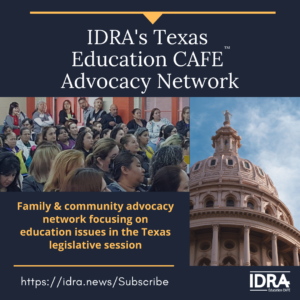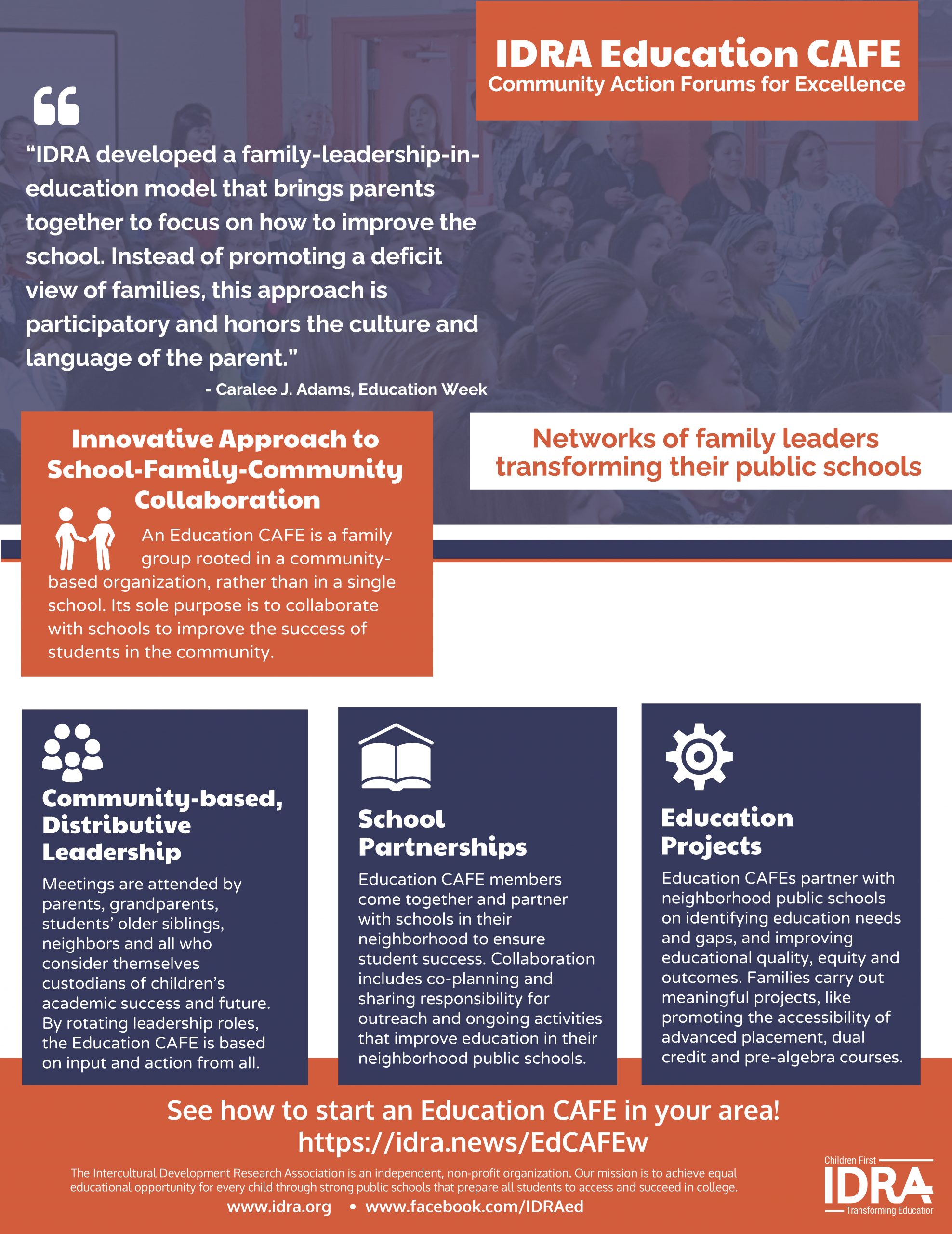• Aurelio M. Montemayor, M.Ed. • IDRA Newsletter • April 2021 •
 The Texas Legislature is hearing from a new contingent of families through IDRA’s Education CAFE network. The legislature holds its regular session from January to May every two years. Education CAFE members in the south Texas Rio Grande Valley started preparations in the fall of 2020 with the leadership of ARISE Adelante, which supports family leadership in education through the work of community centers situated in colonias (unincorporated communities with scarce public services).
The Texas Legislature is hearing from a new contingent of families through IDRA’s Education CAFE network. The legislature holds its regular session from January to May every two years. Education CAFE members in the south Texas Rio Grande Valley started preparations in the fall of 2020 with the leadership of ARISE Adelante, which supports family leadership in education through the work of community centers situated in colonias (unincorporated communities with scarce public services).
The Education CAFE network in the area holds community events once or twice per year focused on education issues members raise. Due to COVID-19, they moved their Mesa Comunitaria online in the fall of 2020 to review education issues concerning families, especially those in economically disadvantaged neighborhoods. Participants identified several central issues of concern: inequitable school funding, college preparation and access, the digital divide exacerbated by the COVID-19 isolation, effective dual language programs in their schools, and mental health and wellness concerns aggravated by the pandemic.
The network asked IDRA to provide several training and support sessions to follow the regional Mesa Comunitaria. They wanted to learn more about the basic structure of the legislature and how bills become law. Following the general overview and introduction to the legislative process, IDRA provided a training-of-trainers session on how to submit public comments and testimony to the legislature.
Each chamber of the Texas Legislature set new rules for public comment this session as a health precaution. The rules dramatically reduced the opportunities for providing face-to-face testimony. But the Texas House of Representatives set up new systems for accepting written comments online during hearings.
New Texas Education CAFE Advocacy Network
 IDRA launched the Texas Education CAFE Advocacy Network with weekly email alerts identifying upcoming hearings related to the issues families raised. IDRA provides support through email and virtual meetings as participants craft and submit their comments. Spanish speakers develop their ideas and written comments in Spanish, and IDRA provides translation support. For many, this is their first time submitting official public commentary on proposed legislation.
IDRA launched the Texas Education CAFE Advocacy Network with weekly email alerts identifying upcoming hearings related to the issues families raised. IDRA provides support through email and virtual meetings as participants craft and submit their comments. Spanish speakers develop their ideas and written comments in Spanish, and IDRA provides translation support. For many, this is their first time submitting official public commentary on proposed legislation.
For example, on the issue of school funding, excerpts of testimony submitted by parents include the following.
“I’m asking for resources so that all districts have trained teachers so that all students can achieve at a high level.” – Raquel Negrete
“We want to ask you that more funds be destined for the schools so that we have prepared teachers, help in counseling for the students, safe transportation and a safe environment for the protection of our children so that parents have more peace of mind knowing that their children go to school in an appropriate environment.” – Mari Orozco
“Teachers are going to have a bigger job. They are going to need more psychologists to support them. With all that is happening, the pandemic, the confinement and everything, there will be collateral damage. So, you need to allocate funds to either train the teachers more or hire specialized personnel to treat anxiety and stress.” – Brenda García
The parents and caretakers also publish their opinions on social media, send letters to the state legislators from their region, and even present their ideas to their local school boards and urge them to join in advocating key issues with state legislators.
Education CAFEs are intergenerational by design. Some students submitted their own testimony supporting broadband proposals. For example, Andrea Guzmán said: “With slow Internet, we become anxious and stressed because the pages won’t load fast enough. We have the constant thought that the Internet might crash at any moment and we won’t be able to access the exam anymore.”
This process demonstrates the power of IDRA’s Family Leadership in Education framework as it lives in the IDRA Education CAFE model. The key elements of the model are: (1) community-based, distributive leadership (for collective action); (2) school partnerships; and (3) education projects that affect school policy and practice. The projects are the laboratories for the parents and caretakers to take action, and they showcase how families – especially those marginalized, ignored and generally seen through a deficit lens – can and do affect educational policy and practice.
Families are learning the details about how legislation that impacts their children is developed and how they can voice their opinions about critical issues. Families, previously unheard, are influencing education policy.
Each Education CAFE’s project emerges from critical conversations in highly-engaged meetings. Sometimes a local group is alerted by other families or advocates of policy issues related to their concerns. Common themes from the network result in regional efforts. A project can be very local, such as getting a nearby school to open its doors to the Education CAFE group or to take care of specific needs in the building. Other projects can be larger, such as giving public comment or testimony on state and national legislative issues.
 In this process, participants are learning the details about how legislation that impacts their children is developed and how they can voice their opinions about critical issues. Families, previously unheard, are influencing education policy.
In this process, participants are learning the details about how legislation that impacts their children is developed and how they can voice their opinions about critical issues. Families, previously unheard, are influencing education policy.
Family Engagement Across the U.S. South
Through the IDRA EAC-South, IDRA’s family engagement innovations support communities across the 11 southern states and the District of Columbia. For example, in Arkansas, we facilitated a State Board of Education and Department of Education statewide project to define family engagement for the state and to incorporate critical conversations among diverse families as part of the state’s approach to, and support of, authentic family engagement.
With support from the William & Flora Hewlett Foundation, IDRA is forming new Education CAFEs in Georgia and Texas. Our new Southern Education Equity Network (SEEN) will develop a virtual network to support education advocates; expand culturally-sustaining teaching that accurately portrays the contributions of all communities; eliminate discipline and policing practices that adversely affect students of color; and connect advocates with state-level policy fellows. By empowering students, families, educators and communities to confront systemic racism, SEEN’s work is aligned with the foundation’s commitment to racial equity.
Get more information about IDRA’s Education CAFE model see our infographic, 5 Steps to Start an IDRA Education CAFE. Also see our Family Engagement Online Tools for Educators with five video chapters.
Aurelio M. Montemayor, M.Ed., is IDRA Family Engagement Coordinator and directs IDRA’s Education CAFE work. Comments and questions may be directed to him via email at aurelio.montemayor@idra.org.
[©2021, IDRA. This article originally appeared in the April 2021 IDRA Newsletter by the Intercultural Development Research Association. Permission to reproduce this article is granted provided the article is reprinted in its entirety and proper credit is given to IDRA and the author.]


